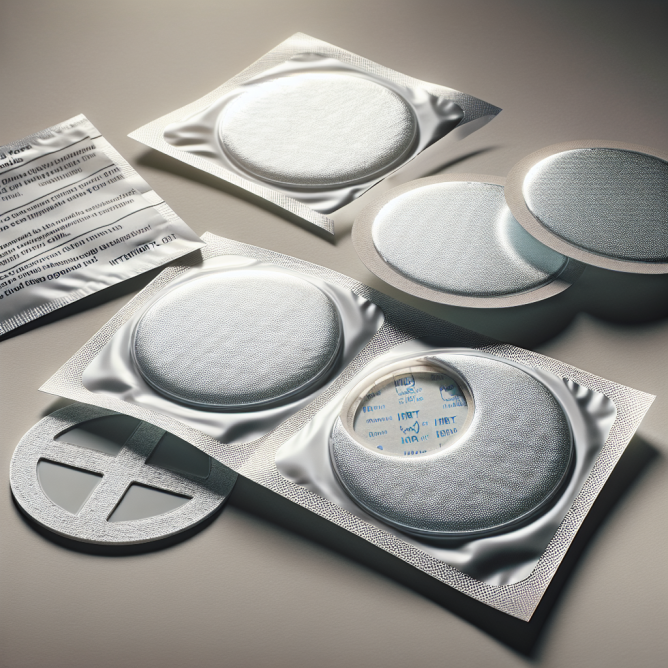HRT Hormone Patches: A Convenient and Effective Way to Manage Menopause Symptoms
Menopause is a natural phase in a woman’s life, but it can also be a challenging one. The decline in estrogen levels can lead to a range of symptoms, including hot flashes, night sweats, vaginal dryness, and mood swings. Hormone replacement therapy (HRT) is a common treatment for managing these symptoms, but traditional forms of HRT, such as pills and creams, can have side effects and require daily dosing. HRT hormone patches offer a more convenient and effective alternative.
HRT hormone patches are adhesive patches that contain estrogen and progestogen, which are hormones that help regulate the menstrual cycle and alleviate menopause symptoms. The patches are applied to the skin and deliver a steady dose of hormones over a period of several days. Unlike traditional HRT, which requires daily dosing, patches can be worn for up to a week at a time, making them a more convenient option for women who prefer not to take daily pills or apply creams.
One of the main benefits of HRT hormone patches is their effectiveness in managing menopause symptoms. Studies have shown that patches are just as effective as traditional HRT forms in reducing hot flashes, night sweats, and vaginal dryness. In fact, some women may find that patches are more effective because they provide a more consistent and steady release of hormones. This can help to reduce the frequency and intensity of hot flashes and night sweats, which can be particularly disruptive during sleep.
Another benefit of HRT hormone patches is their convenience. Because they can be worn for up to a week at a time, women don’t have to remember to take a pill or apply a cream every day. This can be particularly helpful for women who have busy schedules or who travel frequently. Patches are also less likely to cause stomach upset or other gastrointestinal side effects that can be associated with oral HRT forms.

However, it’s important to note that HRT hormone patches, like all forms of HRT, have potential risks and side effects. Estrogen and progestogen can increase the risk of blood clots, stroke, and breast cancer, particularly in women who have a history of these conditions. Women who are at high risk for these conditions may need to avoid HRT altogether or use it with caution. It’s also important to talk to a healthcare provider about the benefits and risks of HRT hormone patches and to have regular check-ups to monitor for any potential side effects.
In addition to managing menopause symptoms, HRT hormone patches can also have other health benefits. Estrogen has been shown to help protect against osteoporosis, a condition that causes bones to become weak and brittle. HRT hormone patches can also help to reduce the risk of colon cancer and heart disease in women who have gone through menopause. However, it’s important to note that the benefits of HRT hormone patches should be weighed against the potential risks and side effects, and women should talk to their healthcare provider about whether HRT is right for them.
In conclusion, HRT hormone patches offer a convenient and effective way to manage menopause symptoms. They provide a steady release of hormones over a period of several days, making them a more convenient option for women who prefer not to take daily pills or apply creams. HRT hormone patches are just as effective as traditional HRT forms in reducing hot flashes, night sweats, and vaginal dryness, and they can also have other health benefits. However, it’s important to talk to a healthcare provider about the benefits and risks of HRT hormone patches and to have regular check-ups to monitor for any potential side effects. By working with a healthcare provider, women can make informed decisions about whether HRT hormone patches are right for them.
References:
1. National Institute on Aging. (2021). Hormone Replacement Therapy (HRT). Retrieved from https://www.nia.nih.gov/health/hormone-replacement-therapy-hrt

2. Mayo Clinic. (2021). Hormone replacement therapy (HRT). Retrieved from https://www.mayoclinic.org/tests-procedures/hormone-replacement-therapy/about/pac-20384614
3. American College of Obstetricians and Gynecologists. (2021). Menopause: Hormone Therapy. Retrieved from https://www.acog.org/Patients/FAQs/Menopause-Hormone-Therapy
4. National Health Service. (2021). Hormone replacement therapy (HRT). Retrieved from https://www.nhs.uk/conditions/hormone-replacement-therapy-hrt/
5. Women’s Health Concern. (2021). Hormone Replacement Therapy (HRT). Retrieved from https://www.womens-health-concern.org/help-self/hormone-replacement-therapy-hrt/
6. National Institute of Child Health and Human Development. (2021). Hormone Replacement Therapy (HRT). Retrieved from https://www.nichd.nih.gov/health/topics/hormone-replacement-therapy-hrt/conditioninfo/pagecontent.aspx
7. National Institute on Aging. (2021). Menopause and Osteoporosis. Retrieved from https://www.nia.nih.gov/health/menopause-and-osteoporosis
8. Mayo Clinic. (2021). Hormone replacement therapy (HRT): Risks. Retrieved from https://www.mayoclinic.org/tests-procedures/hormone-replacement-therapy/about/pac-20384614
9. National Health Service. (2021). Hormone replacement therapy (HRT): Risks. Retrieved from https://www.nhs.uk/conditions/hormone-replacement-therapy-hrt/risks/
10. American College of Obstetricians and Gynecologists. (2021). Menopause: Hormone Therapy. Retrieved from https://www.acog.org/Patients/FAQs/Menopause-Hormone-Therapy
11. Women’s Health Concern. (2021). Hormone Replacement Therapy (HRT). Retrieved from https://www.womens-health-concern.org/help-self/hormone-replacement-therapy-hrt/
12. National Institute of Child Health and Human Development. (2021). Hormone Replacement Therapy (HRT). Retrieved from https://www.nichd.nih.gov/health/topics/hormone-replacement-therapy-hrt/conditioninfo/pagecontent.aspx
13. National Health Service. (2021). Hormone replacement therapy (HRT): Benefits. Retrieved from https://www.nhs.uk/conditions/hormone-replacement-therapy-hrt/benefits/
14. Mayo Clinic. (2021). Hormone replacement therapy (HRT): Benefits. Retrieved from https://www.mayoclinic.org/tests-procedures/hormone-replacement-therapy/about/pac-20384614
15. American College of Obstetricians and Gynecologists. (2021). Menopause: Hormone Therapy. Retrieved from https://www.acog.org/Patients/FAQs/Menopause-Hormone-Therapy
16. Women’s Health Concern. (2021). Hormone Replacement Therapy (HRT). Retrieved from https://www.womens-health-concern.org/help-self/hormone-replacement-therapy-hrt/
17. National Institute of Child Health and Human Development. (2021). Hormone Replacement Therapy (HRT). Retrieved from https://www.nichd.nih.gov/health/topics/hormone-replacement-therapy-hrt/conditioninfo/pagecontent.aspx
18. National Health Service. (2021). Hormone replacement therapy (HRT): How it works. Retrieved from https://www.nhs.uk/conditions/hormone-replacement-therapy-hrt/how-it-works/
19. Mayo Clinic. (2021). Hormone replacement therapy (HRT): How it works. Retrieved from https://www


